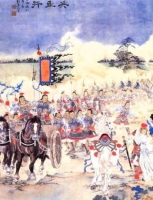| 多首一页 |
兵车行
A Song of War-chariots
杜甫
耶娘妻子走相送,尘埃不见咸阳桥。
牵衣顿足拦道哭,哭声直上干云霄!
道旁过者问行人,行人但云点行频。
或从十五北防河,便至四十西营田。
去时里正与裹头,归来头白还戍边!
边亭流血成海水,武皇开边意未已。
君不闻,汉家山东二百州,千村万落生荆杞!
纵有健妇把锄犁,禾生陇亩无东西。
况复秦兵耐苦战,被驱不异犬与鸡。
长者虽有问,役夫敢申恨?
且如今年冬,未休关西卒。
县官急索租,租税从何出?
信知生男恶,反是生女好。
生女犹得嫁比邻,生男埋没随百草!
君不见,青海头,古来白骨无人收。
新鬼烦冤旧鬼哭,天阴雨湿声啾啾!
译者: Witter Bynner
【白话文】 车辆隆隆响,战马萧萧鸣,出征士兵弓箭各自佩在腰。
爷娘妻子儿女奔跑来相送,尘埃飞扬不见咸阳桥。
拦在路上牵着士兵衣服顿脚哭,哭声直上天空冲云霄。
路旁经过的人问出征士兵怎么样,出征士兵只是说按名册征兵很频繁。
有的人十五岁到黄河以北去戍守,有的人四十岁到西部边疆去种田。
去时里长给有的壮丁裹头巾,他们回时已经白头还要去守边。
边疆无数士兵流血形成了海水,武皇开拓边疆的念头还没停止。
您没听说汉家华山以东两百州,百千村落长满了草木。
即使有健壮的妇女手拿锄犁耕种,田土里的庄稼也长得没有东西行列。
况且秦地的士兵又能够苦战,被驱使去作战与鸡狗没有分别。
尽管长辈有疑问,服役的人们怎敢伸诉怨恨?
就象今年冬天,还没有停止征调函谷关以西的士兵。
县官紧急地催逼百姓交租税,租税从哪里出?
如果确实知道生男孩是坏事情,反而不如生女孩好。
生下女孩还能够嫁给近邻,生下男孩死于沙场埋没在荒草间。
您没有看见,青海的边上,自古以来战死士兵的白骨没人掩埋。
新鬼烦恼地怨恨旧鬼哭泣,天阴雨湿时众鬼啾啾地喊叫。
【注释】 1.行:本是乐府歌曲中的一种体裁。但《兵车行》是杜甫自创的新题。
2.辚辚:车轮声。萧萧:马鸣声。行人:指被征出发的士兵。
3.走:奔跑。咸阳桥:在咸阳西南,横跨渭水的一座大桥。
4.干:冲。
5.过者:过路的人,这里是杜甫自称。点行:当时征兵用语,即按名册点名征召出征。"但云"以下,全是行人的答话。
6.或:不定指代词,有的、有的人。防河:当时常与吐蕃发生战争,曾征召陇右、关中、朔方诸军集结河西一带防御。因其地在长安以北,所以说"北防河"。西营田:古时实行屯田制,军队无战事即种田,有战事即作战。"西营田"也是防备吐蕃的。
7.里正:唐制,每百户设一里正,负责管理户口。检查民事、催促赋役等。右时以皂罗(黑绸)三尺裹头,曰头巾。新兵因为年纪小,所以需要里正给他裹头。
8.武皇:汉武帝刘彻。唐诗中常有以汉指唐的委婉避讳方式。这里借武皇代指唐玄宗。因为二者都有穷兵黩武之举。开边:用武力开拓边疆。
9.汉家:代指唐。荆杞:荆棘与杞柳,都是野生灌木。
10.秦兵:指关中一带的士兵。耐苦战--能顽强苦战。这句说关中的士兵能顽强苦战,像鸡狗一样被赶上战场卖命。
11.长者:即上文的"道旁过者",即杜甫。征人敬称他为"长者"。"役夫敢伸恨":征人自言不敢诉说心中的冤屈愤恨。这是反诘语气,表现士卒敢怒而不敢言的情态。
12.关西:当时指函谷关以西的地方。这两句说,因为对吐蕃的战争还未结束,所以关西的士兵都未能罢遣还家。
13.比邻:近邻。
14.青海头:即青海边。这里是自汉代以来,汉族经常与西北少数民族发生战争的地方。唐初也曾在这一带与突厥、吐蕃发生大规模的战争。
15.啾啾:象声词,表示一种呜咽之声。
【赏析】 题解:这首诗是讽世伤时之作,也是杜诗中的名篇,为历代所推崇。诗旨在讽刺唐玄宗穷兵黩武给人民带来莫大的灾难,充满非战色彩。 诗的开头七句为第一段,写军人家属送别儿子、丈夫出征的悲惨情景,描绘了一幅震人心弦的送别图。“道旁”十四句为第二段,通过设问,役人直诉从军后妇女代耕,农村萧条零落的境况。“长者” 十四句为第三段,写征夫久不得息,连年征兵,百姓唯恐生男和青海战场尸骨遍野,令人不寒而的情况。全诗把唐王朝穷兵黩武的罪恶,揭露得尽致淋漓。 诗寓情于叙事之中,在叙述中张翕变化有序,前后呼应,严谨缜密。诗的字数杂言互见,韵脚平仄互换,声调抑扬顿挫,情意低昂起伏。既井井有条,又曲折多变,真可谓 “新乐府”诗的典范。
这是一首反对唐玄宗穷兵黩武的政治讽刺诗,可能作于天宝十载(751)。天宝以后,唐王朝对我国边疆少数民族的征战越来越频繁,战争的性质,已由天宝以前的制止侵扰,安定边疆,转化为残酷征伐。连年征战,给边疆民族和中原人民都带来深重的灾难。
《资治通鉴》卷216载:"天宝十载四月,剑南节度使鲜于仲通讨南诏蛮,大败于沪南。时仲通将兵八万,……军大败,士卒死者六万人,仲通仅以身免。杨国忠掩其败状,仍叙其战功。……制大募两京及河南北兵以击南诏。人闻云南多瘴疬,未战,士卒死者十八九,莫肯应募。杨国忠遣御史分道捕人,连枷送诣军所。……于是行者愁怨,父母妻子送之,所在哭声振野?"
这首诗大概就是为此事而作的(沈德潜认为此诗乃"为明皇用兵吐番而作"(《唐诗别裁》),不确)。全诗分为两大段:首段叙事,写送别的惨状。"问行人"以下为第二段,由征夫诉苦,是记言。诗人深刻地揭露了李唐王朝穷兵黩武给人民造成的深重灾难,表达了对人民不幸的真挚而深厚的同情。这是杜甫第一首为人民的苦难而写作的诗歌。
这是一首七言歌行,诗中多处使用了民歌的"顶真"手法,诵读起来,累累如贯珠,音调和谐动听。另外,还运用了对话方式和一些口语,使读者有身临现场的真切感。《唐宋诗醇》云:"此体创自老杜,讽刺时事而托为征夫问答之词。言之者无罪,闻之者足以为戒,《小雅》遗音也。篇首写得行色匆匆,笔势汹涌,如风潮骤至,不可逼视。以下出点行之频,出开边之非,然后正说时事,末以惨语结之。词意沉郁,音节悲壮,此天地商声,不可强为也。"
[鉴赏]
天宝以后,唐王朝对西北、西南少数民族的战争越来越频繁。这连年不断的大规模战争,不仅给边疆少数民族带来沉重灾难,也给广大中原地区人民带来同样的不幸。
据《资治通鉴》卷二百一十六载:“天宝十载四月,剑南节度使鲜于仲通讨南诏蛮,大败于泸南。时仲通将兵八万,……军大败,士卒死者六万人,仲通仅以身免。杨国忠掩其败状,仍叙其战功。……制大募两京及河南北兵以击南诏。人闻云南多瘴疠,未战,士卒死者什八九,莫肯应募。杨国忠遣御史分道捕人,连枷送诣军所。……于是行者愁怨,父母妻子送之,所在哭声振野。”这段历史记载,可当作这首诗的说明来读。而这首诗则艺术地再现了这一社会现实。
“行”是乐府歌曲的一种体裁。杜甫的《兵车行》没有沿用古题,而是缘事而发,即事名篇,自创新题,运用乐府民歌的形式,深刻地反映了人民的苦难生活。
诗歌从蓦然而起的客观描述开始,以重墨铺染的雄浑笔法,如风至潮来,在读者眼前突兀展现出一幅震人心弦的巨幅送别图:兵车隆隆,战马嘶鸣,一队队被抓来的穷苦百姓,换上了戎装,佩上了弓箭,在官吏的押送下,正开往前线。征夫的爷娘妻子乱纷纷地在队伍中寻找、呼喊自己的亲人,扯着亲人的衣衫,捶胸顿足,边叮咛边呼号。车马扬起的灰尘,遮天蔽日,连咸阳西北横跨渭水的大桥都被遮没了。千万人的哭声汇成震天的巨响在云际回荡。“耶娘妻子走相送”,一个家庭支柱、主要劳动力被抓走了,剩下来的尽是些老弱妇幼,对一个家庭来说不啻是一个塌天大祸,怎么不扶老携幼,奔走相送呢?一个普通“走”字,寄寓了诗人多么浓厚的感情色彩!亲人被突然抓兵,又急促押送出征,眷属们追奔呼号,去作那一刹那的生死离别,是何等仓促,何等悲愤!“牵衣顿足拦道哭”,一句之中连续四个动作,又把送行者那种眷恋、悲怆、愤恨、绝望的动作神态,表现得细腻入微。诗人笔下,灰尘弥漫,车马人流,令人目眩;哭声遍野,直冲云天,震耳欲聋!这样的描写,给读者以听觉视觉上的强烈感受,集中展现了成千上万家庭妻离子散的悲剧,令人触目惊心!
接着,从“道旁过者问行人”开始,诗人通过设问的方法,让当事者,即被征发的士卒作了直接倾诉。
“道旁过者”即过路人,也就是杜甫自己。上面的凄惨场面,是诗人亲眼所见;下面的悲切言辞,又是诗人亲耳所闻。这就增强了诗的真实感。“点行频”,意思是频繁地征兵,是全篇的“诗眼”。它一针见血地点出了造成百姓妻离子散,万民无辜牺牲,全国田亩荒芜的根源。接着以一个十五岁出征,四十岁还在戍边的“行人”作例,具体陈述“点行频”,以示情况的真实可靠。“边庭流血成海水,武皇开边意未已。”“武皇”,是以汉喻唐,实指唐玄宗。杜甫如此大胆地把矛头直接指向了最高统治者,这是从心底迸发出来的激烈抗议,充分表达了诗人怒不可遏的悲愤之情。
诗人写到这里,笔锋陡转,开拓出另一个惊心动魄的境界。诗人用“君不闻”三字领起,以谈话的口气提醒读者,把视线从流血成海的边庭转移到广阔的内地。诗中的“汉家”,也是影射唐朝。华山以东的原田沃野千村万落,变得人烟萧条,田园荒废,荆棘横生,满目凋残。诗人驰骋想象,从眼前的闻见,联想到全国的景象,从一点推及到普遍,两相辉映,不仅扩大了诗的表现容量,也加深了诗的表现深度。
从“长者虽有问”起,诗人又推进一层。“长者”,是征夫对诗人的尊称。“役夫”是士卒自称。“县官”指唐王朝。“长者”二句透露出统治者加给他们的精神桎梏,但是压是压不住的,下句就终究引发出诉苦之词。敢怒而不敢言,而后又终于说出来,这样一阖一开,把征夫的苦衷和恐惧心理,表现得极为细腻逼真。这几句写的是眼前时事。因为“未休关西卒”,大量的壮丁才被征发。而“未休关西卒”的原因,正是由于“武皇开边意未已”所造成。“租税从何出?”又与前面的“千村万落生荆杞”相呼应。这样前后照应,层层推进,对社会现实的揭示越来越深刻。这里忽然连用了几个短促的五言句,不仅表达了戍卒们沉痛哀怨的心情,也表现出那种倾吐苦衷的急切情态。这样通过当事人的口述,又从抓兵、逼租两个方面,揭露了统治者的穷兵黩武加给人民的双重灾难。
诗人接着感慨道:如今是生男不如生女好,女孩子还能嫁给近邻,男孩子只能丧命沙场。这是发自肺腑的血泪控诉。重男轻女,是封建社会制度下普遍存在的社会心理。但是由于连年战争,男子的大量死亡,在这一残酷的社会条件下,人们却一反常态,改变了这一社会心理。这个改变,反映出人们心灵上受到多么严重的摧残啊!最后,诗人用哀痛的笔调,描述了长期以来存在的悲惨现实:青海边的古战场上,平沙茫茫,白骨露野,阴风惨惨,鬼哭凄凄。寂冷阴森的情景,令人不寒而栗。这里,凄凉低沉的色调和开头那种人声鼎沸的气氛,悲惨哀怨的鬼泣和开头那种惊天动地的人哭,形成了强烈的对照。这些都是“开边未已”所导致的恶果。至此,诗人那饱满酣畅的激情得到了充分的发挥,唐王朝穷兵黩武的罪恶也揭露得淋漓尽致。
《兵车行》是杜诗名篇,为历代推崇。它揭露了唐玄宗长期以来的穷兵黩武,连年征战,给人民造成了巨大的灾难,具有深刻的思想内容。在艺术上也很突出。首先是寓情于叙事之中。这篇叙事诗,无论是前一段的描写叙述,还是后一段的代人叙言,诗人激切奔越、浓郁深沉的思想感情,都自然地融汇在全诗的始终,诗人那种焦虑不安、忧心如焚的形象也仿佛展现在读者面前。其次在叙述次序上参差错落前后呼应,舒得开,收得起,变化开阖,井然有序。第一段的人哭马嘶、尘烟滚滚的喧嚣气氛,给第二段的倾诉苦衷作了渲染铺垫;而第二段的长篇叙言,则进一步深化了第一段场面描写的思想内容,前后辉映,互相补充。同时,情节的发展与句型、音韵的变换紧密结合,随着叙述,句型、韵脚不断变化,三、五、七言,错杂运用,加强了诗歌的表现力。如开头两个三字句,急促短迫,扣人心弦。后来在大段的七字句中,忽然穿插上八个五字句,表现“行人”那种压抑不住的愤怒哀怨的激情,格外传神。用韵上,全诗八个韵,四平四仄,平仄相间,抑扬起伏,声情并茂。再次,是在叙述中运用过渡句和习用词语,如在大段代人叙言中,穿插“道旁过者问行人,行人但云点行频。”“长者虽有问,役夫敢申恨?”和“君不见”、“君不闻”等语,不仅避免了冗长平板,还不断提示,惊醒读者,造成了回肠荡气的艺术效果。诗人还采用了民歌的接字法,如“牵衣顿足拦道哭,哭声直上干云霄”。“道旁过者问行人,行人但云点行频”等,这样蝉联而下,累累如贯珠,朗读起来,铿锵和谐,优美动听。最后,采用了通俗口语,如“耶娘妻子”、“牵衣顿足拦道哭”、“被驱不异犬与鸡”等,清新自然,明白如话,是杜诗中运用口语非常突出的一篇。前人评及此,曾这样说:“语杂歌谣,最易感人,愈浅愈切。”这些民歌手法的运用,给诗增添了明快而亲切的感染力。
(郑庆笃)
【北美枫文集】唐诗300首
【资料来源】 http://www.lingshidao.com/gushi/tangdai.htm
